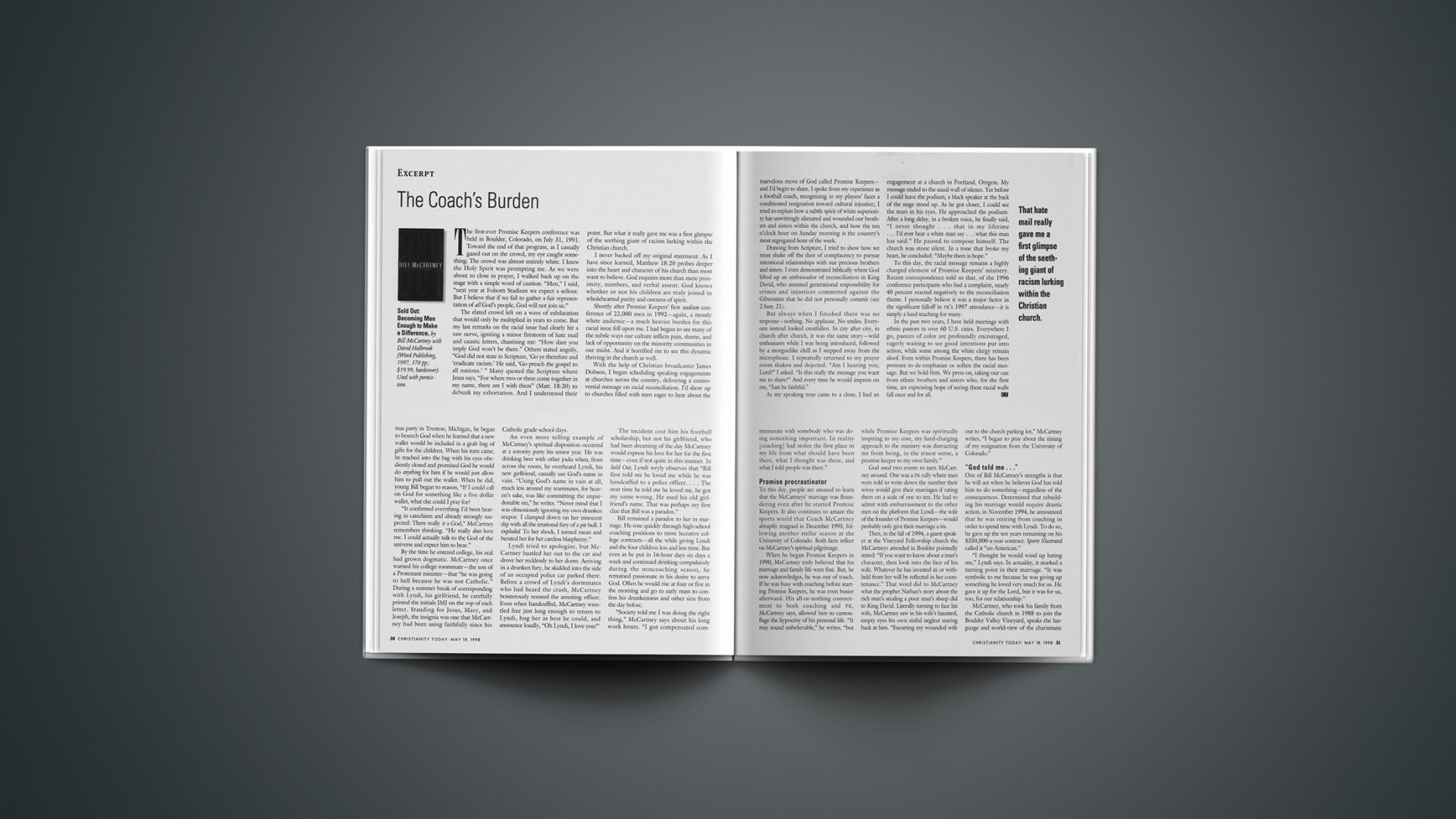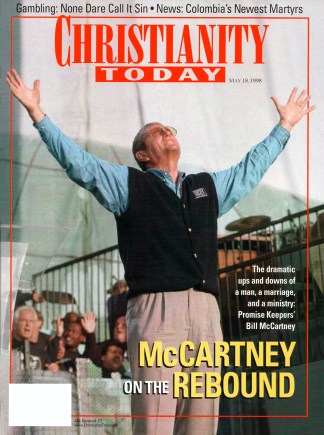Sold Out: Becoming Man Enough to Make a Difference, by Bill McCartney with David Halbrook (Word Publishing, 1997, 370 pp.; $19.99, hardcover). Used with permission.
The first-ever Promise Keepers conference was held in Boulder, Colorado, on July 31, 1991. Toward the end of that program, as I casually gazed out on the crowd, my eye caught something. The crowd was almost entirely white. I knew the Holy Spirit was prompting me. As we were about to close in prayer, I walked back up on the stage with a simple word of caution. “Men,” I said, “next year at Folsom Stadium we expect a sellout. But I believe that if we fail to gather a fair representation of all God’s people, God will not join us.”
The elated crowd left on a wave of exhilaration that would only be multiplied in years to come. But my last remarks on the racial issue had clearly hit a raw nerve, igniting a minor firestorm of hate mail and caustic letters, chastising me: “How dare you imply God won’t be there.” Others stated angrily, “God did not state in Scripture, ‘Go ye therefore and ‘eradicate racism.’ He said, ‘Go preach the gospel to all nations.’ ” Many quoted the Scripture where Jesus says, “For where two or three come together in my name, there am I with them” (Matt. 18:20) to debunk my exhortation. And I understood their point. But what it really gave me was a first glimpse of the seething giant of racism lurking within the Christian church.
I never backed off my original statement. As I have since learned, Matthew 18:20 probes deeper into the heart and character of his church than most want to believe. God requires more than mere proximity, numbers, and verbal assent. God knows whether or not his children are truly joined in wholehearted purity and oneness of spirit.
Shortly after Promise Keepers’ first stadium conference of 22,000 men in 1992—again, a mostly white audience—a much heavier burden for this racial issue fell upon me. I had begun to see many of the subtle ways our culture inflicts pain, shame, and lack of opportunity on the minority communities in our midst. And it horrified me to see this dynamic thriving in the church as well.
With the help of Christian broadcaster James Dobson, I began scheduling speaking engagements at churches across the country, delivering a controversial message on racial reconciliation. I’d show up to churches filled with men eager to hear about the marvelous move of God called Promise Keepers—and I’d begin to share. I spoke from my experience as a football coach, recognizing in my players’ faces a conditioned resignation toward cultural injustice; I tried to explain how a subtle spirit of white superiority has unwittingly alienated and wounded our brothers and sisters within the church, and how the ten o’clock hour on Sunday morning is the country’s most segregated hour of the week.
Drawing from Scripture, I tried to show how we must shake off the dust of complacency to pursue intentional relationships with our precious brothers and sisters. I even demonstrated biblically where God lifted up an ambassador of reconciliation in King David, who assumed generational responsibility for crimes and injustices committed against the Gibeonites that he did not personally commit (see 2 Sam. 21).
But always when I finished there was no response—nothing. No applause. No smiles. Everyone instead looked crestfallen. In city after city, in church after church, it was the same story—wild enthusiasm while I was being introduced, followed by a morguelike chill as I stepped away from the microphone. I repeatedly returned to my prayer room shaken and dejected. “Am I hearing you, Lord?” I asked. “Is this really the message you want me to share?” And every time he would impress on me, “Just be faithful.”
As my speaking tour came to a close, I had an engagement at a church in Portland, Oregon. My message ended to the usual wall of silence. Yet before I could leave the podium, a black speaker at the back of the stage stood up. As he got closer, I could see the tears in his eyes. He approached the podium. After a long delay, in a broken voice, he finally said, “I never thought … that in my lifetime … I’d ever hear a white man say … what this man has said.” He paused to compose himself. The church was stone silent. In a tone that broke my heart, he concluded: “Maybe there is hope.”
To this day, the racial message remains a highly charged element of Promise Keepers’ ministry. Recent correspondence told us that, of the 1996 conference participants who had a complaint, nearly 40 percent reacted negatively to the reconciliation theme. I personally believe it was a major factor in the significant falloff in PK’s 1997 attendance—it is simply a hard teaching for many.
In the past two years, I have held meetings with ethnic pastors in over 60 U.S. cities. Everywhere I go, pastors of color are profoundly encouraged, eagerly waiting to see good intentions put into action, while some among the white clergy remain aloof. Even within Promise Keepers, there has been pressure to de-emphasize or soften the racial message. But we hold firm. We press on, taking our cue from ethnic brothers and sisters who, for the first time, are expressing hope of seeing these racial walls fall once and for all.
Copyright © 1998 Christianity Today. Click for reprint information.










